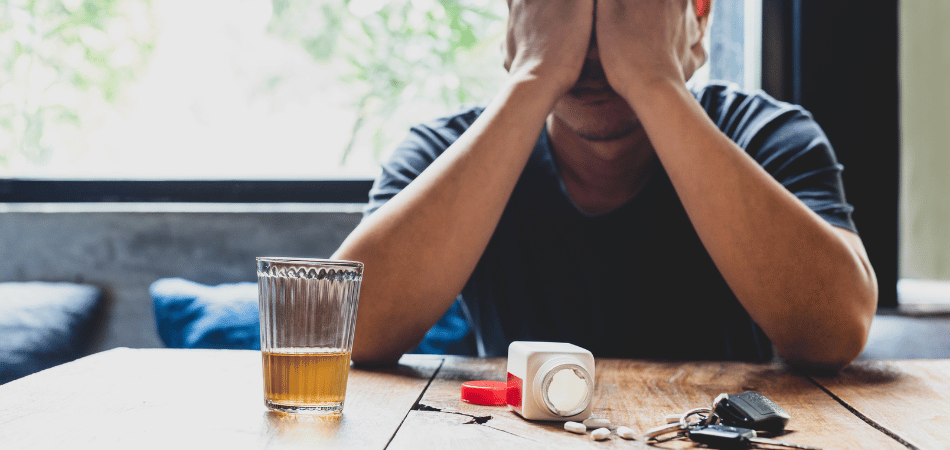Last Updated:
September 10th, 2025
Dual diagnosis is the complex interplay of simultaneous mental health and addiction disorders. It is crucial to understand that these aren’t separate battles; they are two sides of the same coin with the addiction fueling the mental health disorder and vice versa. This vicious cycle, with each condition exacerbating the other, can cause a huge amount of suffering and confusion. It is important to understand, however, that dual diagnosis does not have to be a life sentence of struggle. Co-occurring disorders can indeed have devastating effects but professional treatment offers a beacon of light towards freedom and recovery.

What is dual diagnosis?
Dual diagnosis, also known as co-occurring disorders, is a term used when a person experiences a mental health condition and a substance abuse disorder at the same time. This situation is incredibly common, and in the UK, between 20-37% of individuals with a mental health disorder also struggle with addiction. This makes management and treatment incredibly complex, as both conditions need to be considered for lasting recovery.
Dual diagnosis is influenced by factors such as genetics, environment and personal trauma. For example, a person with a family history of mental health disorders or addiction is at a higher risk. Similarly, those who have experienced trauma or live in stressful environments may turn to substances as an escape, inadvertently setting the stage for dual diagnosis. Some people can also become addicted to their mental health medication, which completely derails treatment and further complicates their situation.

How does a dual diagnosis develop?
Understanding how a dual diagnosis develops is key to unravelling its complexity. However, this cycle of addiction and mental health issues does now have a singular pathway but is unique to each individual.
For some, mental health issues may precede addiction. In these cases, substances may be used as a coping mechanism for symptoms of anxiety, depression or other mental health disorders. This self-medication can temporarily alleviate symptoms, but it often exacerbates them long-term, leading to further substance abuse and, ultimately, addiction.
For others, addiction comes first, as prolonged substance abuse can alter brain chemistry and lead to the development of mental health disorders. Substances that initially brought pleasure or relief eventually lead to conditions like anxiety, depression or paranoia.

The most common dual diagnosis
UKAT treats people with a huge range of different dual diagnoses, all of whom have their unique symptoms and needs. Some of the most common include:
ADHD and addiction
Individuals with Attention Deficit Hyperactivity Disorder
(ADHD) often struggle with impulsivity, hyperactivity and difficulty in focusing. These challenges can lead to substance abuse as a way to self-medicate or enhance focus, but this can exacerbate symptoms, creating a seemingly inescapable cycle.
Anger management and addiction
Anger management issues often coexist with addiction, as substances may be used as a way to cope with intense emotions or to escape from feelings of anger temporarily. However, substance abuse can ultimately heighten feelings of frustration and anger, which are then soothed with drugs or alcohol.
Autism and addiction
Challenges in social interaction, sensory sensitivities and repetitive behaviours characterise
Autism Spectrum Disorder (ASD). Individuals with ASD may turn to substances to alleviate social anxiety or to cope with sensory overload, eventually becoming completely dependent on them.
Anxiety and addiction
Anxiety disorders and addiction are also closely linked, as many people use substances to relieve symptoms of anxiety. However, chronic substance abuse can lead to increased anxiety, panic attacks and heightened stress, reinforcing the dependency on substances.
Borderline personality disorder and addiction
Borderline Personality Disorder (BPD) involves intense emotions, unstable relationships and an unstable self-image. Addiction in individuals with BPD often stems from attempts to manage or self-medicate overwhelming emotions or to cope with the challenges of the disorder.
Bipolar disorder and addiction
Bipolar disorder, characterised by mood swings from mania to depression, frequently co-occurs with addiction. Substances may be used to enhance the manic phase or to alleviate depressive symptoms with addiction, ultimately exacerbating symptoms’ severity.
Codependency and addiction
Codependency involves a dysfunctional relationship where one person enables another’s addiction, mental health issues or dysfunctional behaviour. In the case of codependency and addiction, it can be a major issue as those closest to you enable your substance use rather than trying to help.
Depression and addiction
Depression is commonly linked with addiction, as many turn to substances as a way to escape from feelings of sadness, hopelessness or disinterest in life. Substance abuse, however, can deepen depressive symptoms and create a cycle of dependency and worsening depression.
Grief and addiction
Grief, following the loss of a loved one, can trigger addiction as individuals seek solace in substances. Addiction can then complicate the grieving process, often leading to prolonged or unresolved grief and additional mental health issues.
Insomnia and addiction
Insomnia, or chronic difficulty in falling or staying asleep, often coexists with addiction. Individuals may use substances to induce sleep, but addiction can severely disrupt sleep patterns, leading to a worsening of insomnia.
OCD and addiction
Obsessive-Compulsive Disorder (OCD) is characterised by uncontrollable, recurring thoughts (obsessions) and behaviours (compulsions). Substance abuse in OCD sufferers often aims to alleviate the distress caused by these obsessions and compulsions but often intensifies the symptoms and creates additional mental health challenges.
PTSD and addiction
Post-Traumatic Stress Disorder (PTSD), resulting from traumatic experiences, is frequently associated with addiction. Substances may be used to numb the pain of traumatic memories momentarily, but addiction can exacerbate PTSD symptoms, leading to a deteriorating mental state.
Personality disorder and addiction
Personality disorders involving unhealthy patterns of thinking, functioning and behaving often co-occur with addiction. Substance abuse can be a coping mechanism for the challenges posed by these disorders, but it usually worsens the symptoms and impedes effective treatment.
Schizophrenia and addiction
Schizophrenia is a severe mental disorder characterised by distortions in thinking, perception, emotions, language, sense of self and behaviour. Substances may be used to self-medicate or escape from symptoms, but they can aggravate the disorder and complicate treatment as the individual becomes dependent on them to function.
Self-harm and addiction
Self-harm is a tragic condition that sadly often co-occurs with addiction. Substance abuse may be used as an additional form of self-punishment or to escape emotional pain, but it usually reinforces the self-harming behaviour, creating a vicious cycle.
Stress and addiction
Chronic stress is a common trigger for addiction. Substances are often used to cope with or temporarily escape from stress, but addiction ultimately increases stress levels and makes it harder to manage life’s difficulties.
Suicide and addiction
Suicidal thoughts and behaviours are tragically common in individuals with addiction. Substance abuse may momentarily dampen these tendencies, but the depressive effects of many substances can also deepen despair and feelings of hopelessness.

What does dual diagnosis treatment Involve?
Treating dual diagnosis requires a multi-faceted approach which considers the complexities of the sufferer’s symptoms and underlying issues. UKAT’s rehab centres offer comprehensive addiction treatment that addresses our client’s substance use and also helps manage their co-occurring mental health conditions. UKAT London Clinic goes one step further, providing treatment programmes for addiction and mental health disorders as standalone conditions as well as for dual diagnoses. This approach is crucial because treating only one condition can often lead to relapse or worsening of the untreated condition, which restarts the cycle.
Various types of therapy are employed as part of our rehab treatment programmes to address symptoms of both addiction and mental health disorders. These include:
Group therapy
In group therapy, you will find a supportive environment where you can share your experiences and learn from others who face similar challenges. This setting fosters a sense of community and understanding, which is essential for recovery.
One-to-one therapy
One-to-one therapy offers you personalised attention, addressing the specific issues related to your dual diagnosis. This is a safe space to explore your challenges and develop coping strategies tailored to your unique needs.
Cognitive behavioural therapy (CBT)
CBT is a therapy approach that will help you recognise and change negative thought patterns and behaviours. It is effective for treating both mental health disorders and addiction, making it a valuable tool in your recovery toolkit.
Dialectical behaviour therapy (DBT)
DBT will teach you skills to manage emotions, reduce stress, and improve relationships. This therapy is especially beneficial if you have challenges with emotional regulation, which are common in individuals with a dual diagnosis.
Trauma-based therapy
If your dual diagnosis is rooted in trauma, trauma-based therapy can be a crucial part of your treatment. It addresses the underlying trauma and helps you develop healthier coping mechanisms without requiring drugs or alcohol.
Aftercare
Aftercare is a critical component of your treatment for dual diagnosis. At UKAT, you will have access to weekly group therapy sessions as part of the aftercare program, providing you with ongoing support and guidance as you navigate your journey to recovery.

Begin dual diagnosis recovery today
Embarking on the journey to recovery from dual diagnosis can be daunting, but be assured that you are not alone. At UKAT, we are committed to providing the support and treatment you need to overcome the challenges of co-occurring disorders. Our expert team and comprehensive dual treatment programmes are here to guide you towards a healthier, happier life. Contact UKAT today and let us help you build a new life free from the confines of dual diagnosis.
FAQ’s
What percentage of addicts also suffer from a mental health disorder?
Studies suggest that about 37% of alcohol abusers and 53% of drug abusers also have at least one serious mental illness. This underscores the prevalent overlap between addiction and mental health issues and the need for effective treatment and support.
What should I get treated first if I suffer from both a mental health disorder and addiction?
When dealing with a dual diagnosis, it is crucial to seek integrated treatment that addresses or manages both conditions simultaneously. This approach ensures that both the mental health disorder and the addiction are treated in parallel, which can reduce the risk of relapse and improve overall treatment outcomes.







